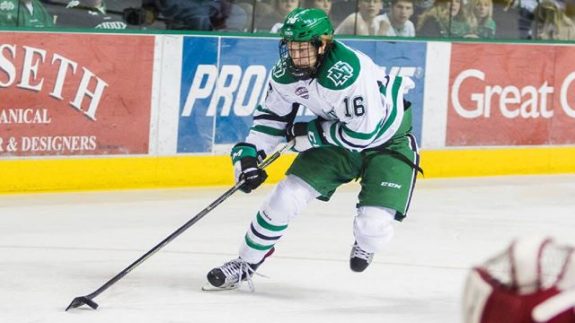There were few positives to take away from the Vancouver Canucks 2016-17 campaign. However, rookie forward Brock Boeser certainly inspired some hope for the future.
Boeser’s Road to the NHL
The Burnsville, Minnesota native was taken by the Canucks 23rd overall in the 2015 draft. It was no surprise to see the organization select the right winger as their 10 first-round picks before that had also been forwards. Boeser was drafted because of his standout performance in the USHL, putting up 73 points (38 goals, 35 assists) in 65 games, a 1.12 PPG average. He opted to play college hockey, enrolling at the University of North Dakota, completing two full seasons with the Fighting Hawks.

College Star
Boeser continued to showcase his talent at the NCAA level. In 74 games he scored 94 points (43 goals, 51 assists), a 1.27 PPG average. A 0.15 rise in PPG showed how much he relishes playing at a higher level. He picked up three awards in his freshman year, most notably the NCHC (National Collegiate Hockey Conference) Rookie of the Year for the 2015-16 season. He also garnered AHCA All-America West First Team accolades, joining Ed Belfour (1986-87) and Kevin Maxwell (1978-79) as the only University of North Dakota freshmen to achieve All-America honours. Washington Capitals star T.J. Oshie had this to say about Boeser following that season:
[miptheme_quote author=”T.J. Oshie” style=”text-center”]He’s got skill, strength. He has a great hockey sense and a good work ethic. You put all that together, you’ve got a pretty special hockey player. There are some players that just stand out, some players that you watch the game, and even if you don’t know anyone, you can look and say hey, who’s this Boeser kid? You can tell he’s got an extra gear to him. He’s fun to watch. He’s going to have a great career one day.[/miptheme_quote]
His sophomore season was not a repeat of his first-year fairy tale. The Fighting Hawks lost in the first knockout round against Boston University. For Brock, his offense dipped, with 34 points in 32 games compared to the 60 points in 42 games he achieved during his rookie outing. Boeser led team scoring by nine points in his rookie season, but fell to third in 2016-17 — only three points from the top spot, though.
NHL Call-Up
After the Fighting Hawks suffered their first-round exit, Boeser was called up by the Canucks. Fate smiled on him as Minnesota would be the location of his NHL debut against his boyhood team. With family scattered across the Xcel Energy Center, he scored his first NHL goal — a dream come true.
Boeser scored four goals and one assist in nine games by the end of the regular season, showing promise with Bo Horvat and Sven Baertschi on the second line. The Sedins also enjoyed his company on the power play, and Boeser scored two of his goals with the twins on the man advantage.
He will look to continue that form going into next season and Canucks Director of Player Development Ryan Johnson has clearly been impressed with the rookie’s preparation:
[miptheme_quote author=”Ryan Johnson, Director of Player Development” style=”text-center”]The way he is carrying himself, his demeanor, his intensity from drill to drill, he has a professional way about him now. Whereas last year maybe [he was] just getting through things, everything he does now has a purpose to it. … He realizes how hard things are going to be (at training camp) in September, a lot of competition, so he’s doing things the right way to put himself in a good spot.[/miptheme_quote]
Strengths
There are three main strengths to Boeser’s game. First, are his offensive instincts — watching him play, it’s clear that his hockey IQ is incredible. He always seems to be where the puck is or ends up. In particular, Canucks fans should pay close attention to the left of the goaltender. He is a constant presence in that spot, hovering for rebounds and dragging defenders away from the net. Throughout his hockey career it’s been his office, to his opponent’s detriment.
Second, his work ethic is a big part of his game and he works harder than most on the ice. This, of course, will be a challenge in the NHL.
Finally, he plays a 200-foot game. Boeser is not a selfishly-offensive player and possesses an intelligent defensive skill-set.
Weaknesses
Boeser is not a finished product and has a couple of things to improve on. He needs to be more explosive in order to really make a mark in the NHL. His physical play also needs some work, which is perhaps why Boeser was called to a third consecutive development camp with the Canucks this summer. At 6-foot-1 and 191 pounds, he may have been asked to stack on some weight this summer to take him over the 200-pound mark.
Mental Strength
Boeser cannot be faulted for his mental strength. He lost his best friend in a car accident while he was abroad playing hockey. Furthermore, his father is battling Parkinson’s Disease, a degenerative disorder of the nervous system. He has found strength from these difficulties and is a passionate family-orientated young man. Mental strength is crucial during a gruelling 82-game NHL schedule and college players simply haven’t played that volume of games at NCAA level.
https://www.youtube.com/watch?v=UY6KrVhDnPc&t=1s
With all of this in mind, Brock Boeser can and will win the Calder Trophy for best rookie of the year. He has the skills to be a great hockey player and the mental toughness that will help him to dig deep when times are tough. I predict that he will score north of 50 points this upcoming season, placing him in Calder contention. Starting on the first line with Bo Horvat and Sven Baertschi and with power play time anything is possible.